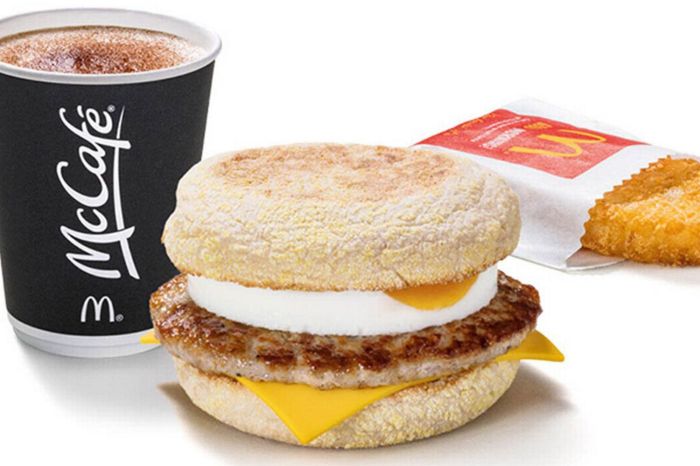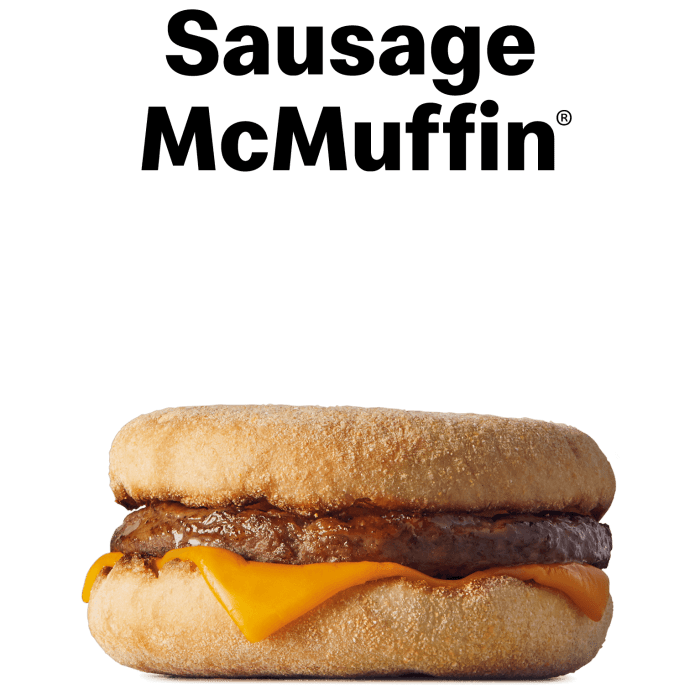Nutritional Composition of a Sausage Egg Cheese McMuffin: Nutrition Sausage Egg Cheese Mcmuffin
Nutrition sausage egg cheese mcmuffin – Okay, so you’re craving a Sausage Egg Cheese McMuffin, right? Totally get it. But before you dig in, let’s spill the tea on what’s actuallyin* that delicious little handheld breakfast bomb. Knowing the nutritional breakdown can help you make informed choices about your diet, especially if you’re trying to keep things balanced.
Macronutrient Breakdown, Nutrition sausage egg cheese mcmuffin
The Sausage Egg Cheese McMuffin is a classic example of a high-fat, moderate-protein, and low-carbohydrate breakfast. It’s important to understand this balance because it directly impacts how your body uses the energy from the food. Let’s break down the macronutrients: A typical Sausage Egg Cheese McMuffin contains approximately 30-35 grams of fat, 15-20 grams of protein, and 15-20 grams of carbohydrates.
The exact amounts can vary slightly depending on the specific ingredients and preparation. This ratio means it’s a great source of quick energy, but moderation is key, especially for those watching their fat intake.
Vitamins and Minerals
While not a powerhouse of vitamins and minerals like a leafy green salad, the Sausage Egg Cheese McMuffin does offer some essential nutrients. You’ll find small amounts of vitamins like vitamin A (from the egg yolk), and some B vitamins (from the egg and sausage). Minerals like iron (from the sausage) and calcium (from the cheese) are also present, although in relatively small quantities.
Precise quantities are difficult to state without knowing the exact recipe and sourcing of ingredients, but it’s safe to say these are present in trace amounts.
Comparison to Other Breakfast Sandwiches
Compared to other breakfast sandwiches, the Sausage Egg Cheese McMuffin tends to be higher in fat and sodium. A healthier alternative might be a breakfast sandwich with turkey sausage, whole-wheat English muffin, and reduced-fat cheese. However, it’s important to note that this comparison is general; specific nutritional content varies widely between brands and variations of the breakfast sandwich.
Think of it like this: it’s a treat, not an everyday staple for a balanced diet.
Nutritional Information per Serving
| Nutrient | Quantity (per serving) | Quantity (per serving) | Quantity (per serving) |
|---|---|---|---|
| Calories | 300-350 | 300-350 | 300-350 |
| Total Fat (g) | 18-22 | 18-22 | 18-22 |
| Saturated Fat (g) | 9-11 | 9-11 | 9-11 |
| Sodium (mg) | 700-800 | 700-800 | 700-800 |
Note
These values are approximate and may vary slightly depending on the specific McMuffin and its preparation.*
Alternative Healthier Options

Okay, so you’re craving that Sausage Egg Cheese McMuffin, but your innersaling* (healthy) self is screaming. Don’t worry, we Jakartans know how to balance indulgence with wellness. Let’s explore some healthier alternatives that still hit the spot without the guilt trip. We’re talking similar levels of protein and satiety – that feeling of being nicely full and satisfied, you know?We can achieve a healthier breakfast without sacrificing taste or that satisfying feeling of a complete meal.
There are plenty of options that provide similar protein and satiety levels to a McMuffin, while significantly reducing the unhealthy fats, sodium, and calories. Plus, making your own version gives you complete control over the ingredients.
Healthier Breakfast Alternatives
Let’s face it, sometimes we need a quick and easy breakfast. Here are some convenient and nutritious alternatives to that McMuffin:
- Overnight Oats: Combine rolled oats, milk (dairy or non-dairy), chia seeds, and your favorite fruits. Prep it the night before, grab it in the morning, and you’re good to go. The fiber and protein will keep you full.
- Greek Yogurt with Berries and Nuts: Greek yogurt is packed with protein. Adding berries provides antioxidants, and nuts offer healthy fats and fiber. This is a simple, high-protein, and refreshing option.
- Whole-wheat English Muffin with Avocado and Egg: A whole-wheat English muffin provides more fiber than a regular muffin. Top it with mashed avocado for healthy fats and a poached or scrambled egg for protein. This combination offers a satisfying and nutritious breakfast.
- Breakfast Burrito (made healthy): Use whole-wheat tortillas, scrambled eggs with veggies like spinach and mushrooms, and a small amount of lean protein like turkey sausage or black beans. Skip the cheese or use a small amount of reduced-fat cheese.
Recipe for a Healthier Homemade Sausage Egg Cheese Muffin
This recipe focuses on using whole-wheat English muffins, leaner sausage, and reducing the cheese. Ingredients:* 1 whole-wheat English muffin, split
Understanding the nutritional content of a sausage, egg, and cheese McMuffin is important for maintaining a balanced diet. A comparison can be made to breakfast cereals; for example, checking the life cereal cinnamon nutrition facts helps illustrate how different breakfast choices vary in their nutritional profiles. Ultimately, choosing a nutritious breakfast, whether it’s a McMuffin or cereal, contributes to overall well-being.
- 1 large egg
- 1 slice reduced-fat cheddar cheese (or a healthier alternative like feta)
- 1-2 tablespoons turkey sausage, cooked and crumbled (or a vegetarian substitute like mushrooms)
- A sprinkle of black pepper
Instructions:
- Toast the English muffin lightly.
- Scramble the egg in a small pan.
- Layer the cooked turkey sausage (or substitute) and scrambled egg onto the bottom half of the muffin.
- Top with the reduced-fat cheese.
- Cover with the top half of the muffin.
Modifying the McMuffin for Lower Calories and Sodium
To make a McMuffin healthier, consider these modifications:* Ask for no cheese: This significantly reduces fat and calories.
Request less sausage
Reduce the amount of sausage to cut down on fat and sodium.
Order a plain egg McMuffin
This removes the sausage and cheese, lowering the overall calorie and sodium count.
Visual Representation of Nutritional Differences
Imagine two simple bar graphs side-by-side. The first bar graph represents the original McMuffin. The bars would be relatively tall for calories, fat, and sodium. The protein bar would be moderately tall. The second bar graph represents the healthier homemade version.
The bars for calories, fat, and sodium would be significantly shorter than in the first graph. The protein bar, however, would be almost as tall, demonstrating that you can maintain a similar protein level while significantly reducing unhealthy components. The difference in bar heights visually highlights the improvement in nutritional profile.
Marketing and Consumer Perception

McDonald’s marketing of the Sausage Egg Cheese McMuffin relies heavily on its association with convenience and a quick, satisfying breakfast. They target busy individuals who need a fast and familiar meal to start their day, often using imagery of people rushing to work or enjoying a quick bite before heading out. The messaging often focuses on the familiar taste and ease of access, rather than dwelling on detailed nutritional information.The role of advertising in shaping consumer perception of the McMuffin’s nutritional value is complex.
While McDonald’s doesn’t explicitly advertise it as a health food, their advertising often uses visuals that evoke feelings of comfort and satisfaction, subtly downplaying any potential negative health connotations. This creates a subconscious association between the McMuffin and a positive breakfast experience, overshadowing any concerns about its caloric content or fat levels. The use of bright colors and happy imagery further reinforces this positive association.
Target Demographic
The primary target demographic for the Sausage Egg Cheese McMuffin is young adults and working professionals aged 18-45, particularly those with busy lifestyles and limited time for breakfast preparation. This group is often time-constrained and values convenience and affordability. Secondary demographics could include families grabbing a quick breakfast before school or work, or even older individuals seeking a familiar and readily available breakfast option.
Marketing campaigns often reflect this, showing busy individuals enjoying the McMuffin on their way to work or during a quick break.
Common Consumer Perceptions of the McMuffin’s Healthiness
Consumer perceptions of the McMuffin’s healthiness are largely influenced by advertising and personal biases. Here’s a summary:
- Generally Unhealthy: Many consumers understand that the McMuffin is not a health food, associating it with high fat, sodium, and calorie content.
- Convenient and Occasional Treat: It’s often viewed as an acceptable occasional treat or a convenient option when time is short, rather than a regular part of a healthy diet.
- Taste Preference Trumps Health Concerns: The delicious taste and familiar comfort often outweigh health concerns for many consumers, leading to frequent consumption despite awareness of its nutritional profile.
- Lack of Detailed Nutritional Awareness: Many consumers may not be fully aware of the specific nutritional content (calories, fat, sodium) of the McMuffin, relying on general perceptions rather than detailed information.
- Comparison to Other Breakfast Options: The perception of the McMuffin’s healthiness can also be influenced by comparisons to other breakfast options, both fast food and home-cooked meals. It may be viewed as relatively healthier than some other fast-food breakfast options, but less healthy than a homemade breakfast.
Answers to Common Questions
What are the potential long-term health effects of regularly eating a Sausage Egg Cheese McMuffin?
Regular consumption could contribute to weight gain, increased cholesterol levels, and elevated blood pressure due to high saturated fat and sodium content. It’s best enjoyed occasionally as part of a balanced diet.
Are there vegetarian or vegan alternatives to the Sausage Egg Cheese McMuffin?
Many restaurants and cafes offer vegetarian or vegan breakfast sandwiches using plant-based sausage patties, egg substitutes, and dairy-free cheese alternatives. Homemade versions are also easily customizable.
How many calories are in a Sausage Egg Cheese McMuffin?
The calorie count varies slightly depending on location and preparation, but it generally falls within the range of 300-400 calories.
Can I reduce the sodium content of a Sausage Egg Cheese McMuffin?
Requesting less salt during preparation can slightly reduce the sodium content. However, significant reduction requires opting for healthier alternatives with lower inherent sodium levels.


0